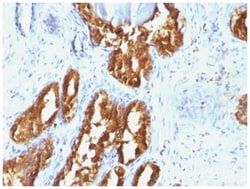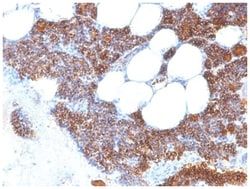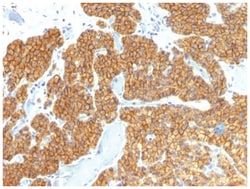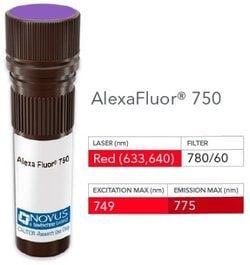Prostatic Acid Phosphatase/ACPP Antibody (ACPP/1338) - Azide and BSA Free, Novus Biologicals™
Manufacturer: Fischer Scientific
The price for this product is unavailable. Please request a quote
Antigen
Prostatic Acid Phosphatase/ACPP
Classification
Monoclonal
Concentration
1 mg/mL
Dilution
Flow Cytometry 0.5 - 1 ug/million cells, Immunocytochemistry/Immunofluorescence 0.5 - 1 ug/ml, Immunohistochemistry-Paraffin 0.5 - 1.0 ug/ml, CyTOF-ready
Gene Alias
acid phosphatase, prostate, ACP3, ACP-3, EC 3.1.3.2, PAP, prostatic acid phosphatase, prostatic acid phosphotase
Host Species
Mouse
Molecular Weight of Antigen
52 kDa
Quantity
200 μg
Research Discipline
Cell Cycle and Replication
Gene ID (Entrez)
55
Target Species
Human
Form
Purified
Applications
Flow Cytometry, Immunocytochemistry, Immunofluorescence, Immunohistochemistry (Paraffin), CyTOF
Clone
ACPP/1338
Conjugate
Unconjugated
Formulation
PBS with No Preservative
Gene Symbols
ACPP
Immunogen
Recombinant human ACPP fragment
Purification Method
Protein A or G purified
Regulatory Status
RUO
Primary or Secondary
Primary
Test Specificity
Recognizes a protein of 52kDa, identified as prostate specific acid phosphatase (PSAP). This enzyme catalyzes the conversion of orthophosphoric monoester to alcohol and orthophosphate. It is synthesized under androgen regulation and is secreted by the epithelial cells of the prostate gland. PSAP is found in non-neoplastic adult and fetal prostatic glands, primary and metastatic prostatic carcinomas. It shows no staining in granulocytes, osteoclasts, parietal cells of the stomach, liver cells, renal cell or breast carcinomas.
Content And Storage
Store at -20 to -80C. Avoid freeze-thaw cycles.
Isotype
IgG1 κ
Description
- Prostatic Acid Phosphatase/ACPP Monoclonal specifically detects Prostatic Acid Phosphatase/ACPP in Human samples
- It is validated for Immunohistochemistry, Immunohistochemistry-Paraffin.






